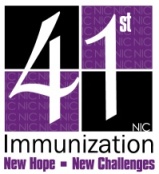
|
|
CDC NIP/NIC Home Page
|
Monday, March 5, 2007 - 3:55 PM
23
National Survey of Hospital Perinatal Hepatitis B Prevention Policies and Practices
Bayo C. Willis1, Lisa Jacques-Carroll, Susan Wang2, and Yuan Kong3. (1) National Center for Immunization and Respiratory Diseases, Centers for Disease Control and Prevention, 1600 Clifton Rd, NE, MS E-52, Atlanta, GA, USA, (2) Division of Viral Hepatitis, Centers for Disease Control and Prevention, Atlanta, GA, USA, (3) SAIC, Atlanta, GA, USA
Learning Objectives for this Presentation:
By the end of this presentation participants will understand hospital perinatal hepatitis B prevention policies and practices in the US in 2005-2006.
Background:
A revised ACIP recommendation published in December 2005 included new strategies to overcome remaining challenges to preventing perinatal hepatitis B virus transmission. The new ACIP statement recommends that all hospitals implement standing orders for routine administration of hepatitis B vaccination to all medically stable neonates weighing ≥ 2000 grams at birth.
Objectives:
Evaluate maternal HBsAg screening and newborn hepatitis B vaccination policies and practices in delivery hospitals in the US and factors associated with lack of screening and vaccination.
Methods:
In March 2006, a questionnaire was mailed to clinical nurse managers in obstetrics units of a random sample of 242 hospitals with 100 or more annual births to assess existing perinatal hepatitis B prevention policies. Hospitals were also asked to review 25 paired maternal and infant medical records for data on maternal screening and administration of hepatitis B vaccine and hepatitis B immune globulin (HBIG) to infants born on or after October 1, 2005.
Results:
Of responding hospitals (n=186), 130 (70%) had written policies to review prenatal HBsAg results and 77 (50%) had standing orders to review HBsAg results on admission. For mothers without documented HBsAg test results, 116 (62%) hospitals had policies for maternal HBsAg testing and 77 (55%) had standing orders for testing. Sixty-five percent of hospitals had written policies to routinely administer hepatitis B vaccine to all newborns before discharge. Forty-four percent of hospitals received hepatitis B vaccine and 17% received HBIG at no cost from state or local health departments.
Conclusions:
These findings indicate that substantial gaps exist in hospital policies to ensure: review of prenatal HBsAg test results, testing of mothers with unknown HBsAg status, and universal administration of hepatitis B vaccine birth dose to all newborns.